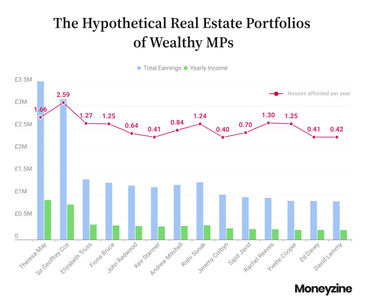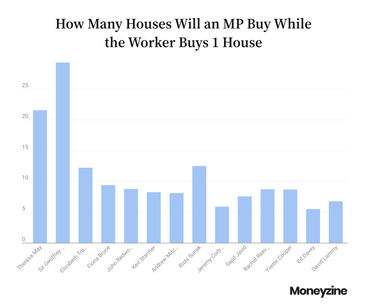- On average, a top-earning MP could afford to buy a mid-range house in their constituency every year, whereas the average worker needs to devote over 11 years of salary to do so.
- An MP's base salary is 2.7 times the average worker's salary.
- Including donations, a top-earning MP takes home 10 times more than the average worker.
- The top 14 MPs by earnings have received over £14 million in donations since the start of the current congress period (end of 2019).
We scoured the financial records of the 14 highest-earning MPs, calculating their real estate potential and comparing it to the financial well-being of the people they represent.
MPs receive a baseline annual salary of £86,584, and many also accept additional wages on top of this already substantial amount. Expenses, donations, and additional earnings –the regular paychecks and gifts they receive from the government and third parties come from a variety of sources. However, they are required by law to document and report these financial interests, allowing the public to view any extra earnings of all MPs. At Moneyzine, we delved into this data and found 14 MPs who have taken home over £14 million on top of their salary since the end of 2019.
In the 4 years since 2019, those without backing from affluent financial allies have struggled through a cost-of-living crisis, battling bills or fighting to feed their families. Through lockdown, and international turmoil, prices have risen, and wages often stagnated. But, perhaps the most expensive commodity of all modern society is housing. With house prices having almost doubled since 2005, for many, owning a house has gone from commonplace to a dream.
The two worlds seem to be in stark contrast in living conditions and daily lifestyle.
The Proof is in the Portfolio; The Hypothetical Real Estate Portfolios of Wealthy MPs
To investigate the extent of this wealth gap, we gathered data on the top 14 highest-earning MPs and their documented financial interests. Then, using the average house prices in their constituency, and their earnings since 2019, we created a hypothetical real estate portfolio for each top-earning MP.

On average, the 14 highest-earning MPs could afford to buy a mid-range house in their constituency outright every year.
Theresa May comes out on top of all MPs for total earnings since 2019, earning over £3.5 million. However, with high house prices in her constituency of Maidenhead, she can only afford 6 mid-range houses with this sum. It’s the MP who represents Torridge and West Devon, Sir Geoffrey Cox, whose hypothetical real estate empire is the largest.
On top of the MPs baseline annual salary of £86,584, Sir Geoffrey received £2.8 million in expenses, donations and additional earnings over the last 4 years, putting his total earnings at £3.1 million - enough to afford 10 houses within his constituency, with plenty of change left over.
In fact, with his current annual earnings, Sir Geoffrey Cox could buy 2 houses outright each year, and still take home an annual salary of £179,000 – nearly 7 times the average wage in Torridge and West Devon.
The massive figures taken home by Theresa May and Sir Geoffrey Cox make the additional earnings of the other MPs seem insubstantial, but they are far from it. David Lammy, the 14th highest earning MP, took home the least on our list but still pocketed amounts most would spend half of their adult lives earning, banking £859,000 in just 4 years.
"In tough times, everyone has to take their share of the pain." ~ Theresa May
Has affluence turned to abundance for these members of Parliament? Just how disconnected have they become from the people they represent? We compared these 14 MPs to the average worker in their constituencies to find out.
The Annual Home Harvest; The Time Spent Saving for Wealthy MPs and their Average Constituents to Afford a Home
In the 14 constituencies that we analysed the average worker would have to spend their entire salary of almost 12 years to purchase a mid-range house - assuming property prices don’t rise during that time. However, the MPs would, on average, only need to put forward less than a year’s salary to afford the same house.
That means that in the time it takes for you to save to buy a house, your representative MP might be able to buy the entire street.

Fake Estate, Real Tycoon
Sir Geoffrey Cox’s massive additional earnings have once again made him the centre of attention. The average worker living in his constituency of Torridge and West Devon would have to save their entire salary for a marathon of 11 years and 4 months to buy a mid-range house in the region. Meanwhile, Sir Geoffrey could afford to purchase one in just 5 months.
Most of Sir Geoffrey Cox’s additional earnings come from Withers LLP – a law firm focused on tax, trust, and estate planning, where he works as a “consultant global counsel”.
Meanwhile, Theresa May’s £886,000 per year is more varied – mostly coming from giving speeches for the Cambridge Speaker Series & the Distinguished Speaker Series, or in the form of gifts from Heathrow Airport.
Jonathan Merry, personal finance expert at Moneyzine.com comments on the findings:
Our analysis of MP earnings has revealed a stark disparity between the financial circumstances of the highest-earning MPs and the average worker in their constituencies. While MPs enjoy substantial salaries and additional earnings, the average worker struggles for years to become a homeowner, with the need to save 100% of their salary for over a decade to purchase a mid-range house. The astronomical figures earned by some MPs and the polarity between them and their constituents highlight the growing disconnect between the representatives and the people they represent.Jonathan Merry, personal finance expert, Moneyzine
Contributors
.jpg)
.jpg)



.jpg)
